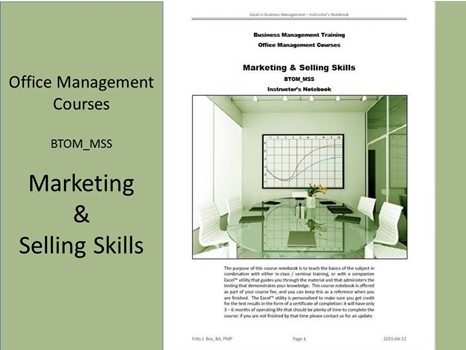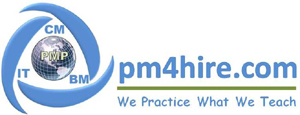
Marketing & Selling Skills BTOM_MSS
One of the interesting areas of confusion in business is that people tend to think of marketing as selling: then they immediately back off from the subject because they do not see themselves as salespeople. Truth is, marketing is the strategic side of how to determine if there is a demand for specific products or services in order to develop the concepts and thus create something to sell in the future. For example, a project manager developing a business case is actively involved in marketing to establish what products or services (or infrastructure, etc.) are needed and then to explain the opportunity by selling it to the corporate executives. The course has a specific theme to explain marketing essentials: it offers opportunity to discuss and analyze specific applications to put a practical spin on theory.
To make projects more exciting, the intent is that we allow individuals to propose their own project, something that they are hoping to achieve in their future: a landscaping business, a horse riding and stables business, a cleaning business, and so on. The principles are easier to see in a simple business context, but they are equally applicable to a more complex business where you may be employed in a (project) management position. It is also an option to think about a type of business that the student wants to work for, so they have an opportunity to prepare a compelling case for an employment arrangement. It makes the course a little more challenging to teach, but it also helps to keep the course fresh and relevant. The sections are:
Introduction
Strategy:
- Develop a Personal Selling Philosophy, a Relationship Strategy, a Product Strategy
- Develop a Customer Strategy, a Presentation Strategy
Managing:
- Managing Yourself and Your Territory, and Communication-Style Bias
Introduction to Personal Selling
- Who Needs Selling Skills - Learning to Sell - What Today’s Salesperson Needs to Know
It is important to emphasize that everyone has a need to understand personal selling as a skill. It can be the core of problem solving – if you cannot sell the solution it might as well not exist. The notion of selling is often marred by past experience with poor salespeople – they seem to always stand out more than those that quietly provide you service so that you make the decisions to purchase in confidence. Those are what you call facilitators that work with you through the purchasing process, which then improves your overall customer experience. It may take a bit more effort to recall such individuals, which makes it challenging to consider a career in sales. Selling is also something that must be natural to you – while you can learn the techniques reviewed in Strategy, your life experience will provide many examples of people “born to sell.”
Develop a Personal Selling Philosophy
- Adopt the Marketing Concept - Value Personal Selling - Be a Problem Solver/Partner for Customers
Develop a Relationship Strategy
- Adopt a Double-Win Philosophy - Project a Professional Image - Maintain High Ethical Standards
Develop a Product Strategy
- Becoming a Product Expert - Sell Benefits (Not the Features) - Position Your Product
Develop a Customer Strategy
- Understanding Buying Behaviour - Discover Individual Customer Needs - Develop a Prospect Base
Develop a Presentation Strategy
- Approach – Presentation – Demonstration – Negotiation – Close - Servicing the Sale
Managing Yourself and Your Territory
- Importance of Managing Yourself and Your Territory
Even a salesperson employed by a company needs to be vigilant about managing their work on the floor, to make sure customer service is as good as it can get, and to make sure they make the sales that keeps the employer happy: nothing like a “call me if you need me” attitude. Learn subtle ways to engage customers without hovering over them.
Managing Communication-Style Bias
- Importance of managing communication style bias
It is often not what you say, but how you say it, that causes people to react in certain ways. Part of this is personality (hard to suppress), but a major part of this is also awareness and self-control, and understanding how customers think and react. Remember that your role is to facilitate the transaction – too much energy chases people out the door.
Learning Formats BTOM_MSS
This course will be available in a classroom setting (public or company private) with approximately 30 contact hours.
PDF – Certificate Of Completion
This course offers a certificate of completion that identifies the course, the student, and a brief description of the course. To receive a certificate the student must have attended at least 80% of the course sessions. This personalized certificate is forwarded to the student by Email.
PDF – Course Notebook
This course includes a notebook in PDF format that provides the minimum knowledge the student must master in order to obtain the certificate. In the notebook you will find references to other study materials. Students receive the notebook by Email when their registration is confirmed.
PDF – Program Overview
An overview of this study program can be downloaded from the website by right-clicking on the program link on the enquiry page.
PDF – Current Training Schedule
A list of upcoming training sessions can be downloaded from the website by right-clicking on the schedule link on the enquiry page.
Registration – Service Providers
To register for any training course please look on the enquiry link page of your service provider (from where you accessed this website). On the page you will find a registration request form where you can order the course that you are interested in. The availability dates will be provided to you, along with payment instructions if you decide to go ahead.

 |
|